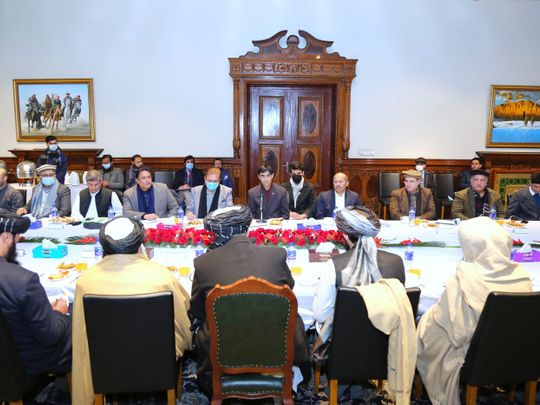
Islamabad: Pakistan and Afghanistan agreed to devise a mechanism to resolve border issues and facilitate trade and trade via land borders. The two countries share a border stretching about 2,600 kilometres with 94 per cent of the border entirely fenced by Pakistan security forces.
The two countries agreed to establish a national-level coordination mechanism for enhancing facilitation at border crossing points. They also agreed to initiate barter trade with modalities to be worked out immediately.
The development was reported following the two-day (January 29-30) visit of Pakistan’s National Security Adviser Moeed Yusuf. He also heads the Afghanistan Inter-Ministerial Coordination Cell (AICC) - a special body set up in October 2021 for Afghanistan-related matters and synergise the government’s efforts from humanitarian assistance to effective border management to prevent any negative spillover into Pakistan.
The NSA’s visit to Kabul “yielded substantive outcomes in terms of forward movement on trade facilitation and social sector support,” the official statement said. During the two-day visit, Pakistan’s NSA with his delegation called on Afghanistan’s acting Deputy Prime Minister Abdul Salam Hanafi and the acting Foreign Minister Mullah Amir Khan Muttaqi to discuss the current situation in Afghanistan and bilateral issues. Dr Yusuf also held delegation-level meetings with Afghan ministers and senior officials dealing with humanitarian and economic issues.
Humanitarian, economic and connectivity projects
Pakistan’s special envoy for Afghanistan Ambassador Muhammad Sadiq and Pakistan’s Ambassador Mansoor Ahmad Khan were among the members of the Pakistan delegation. Ambassador Mansoor said the country would continue to hold meetings to strengthen humanitarian and economic engagement with Afghan authorities.
During the visit, Pakistan offered Afghanistan capacity building and training support in multiple sectors including health, education, banking, customs, railways and aviation among others. Both sides also reiterated their commitment to the early completion of three major connectivity projects including the TAPI gas pipeline, Central Asia South Asia Electricity Transmission and Trade Project (CASA-1000) and Trans-Afghan Railway project. Pakistan earlier announced to provide humanitarian aid worth Rs5 billion ($28 million) to Afghanistan.
Terrorism in border areas
Though there was no mention of any action against terrorism-related activities in the border regions of Pakistan and Afghanistan, local media reports suggested that Afghanistan’s deputy premier assured the Pakistani delegation that Afghan soil would not be used against Pakistan and other neighbours.
In recent months, terror attacks have surged in the border areas on Pakistan’s security personnel by the banned militant group Tehrik-i-Taliban Pakistan (TTP). Pakistani analysts have voiced concerns that Afghan soil was still being used against Pakistan and urged immediate action. However, the NSA recently said that the Taliban government was maintaining cordial ties with Pakistan and recent border fencing issues were “local level issues” and not part of their policy.












